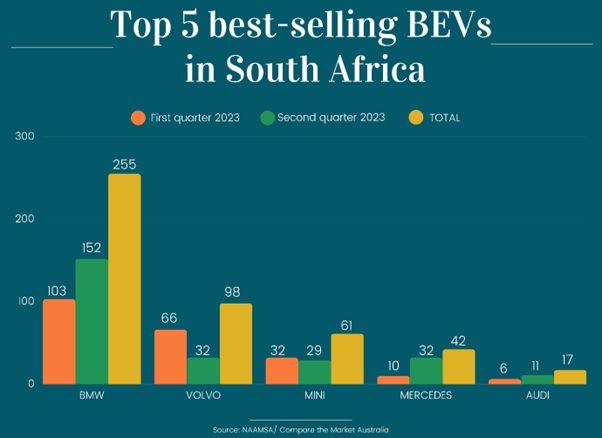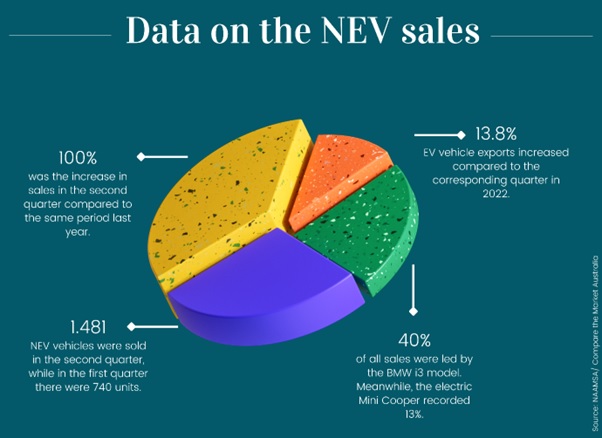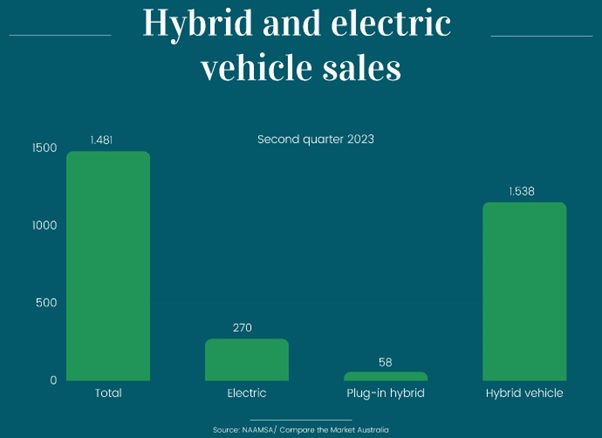New Energy Vehicle Sales in South Africa increased from 738 units in the second quarter of 2022 to 1,481 units in the same quarter of 2023. In fact, in the first half of 2023, 265.970 new energy vehicles were sold in the country.
Year after year, the sale of New Energy Vehicles (NEVs) is constantly rising in various countries around the world, and South Africa is no exception.

In the first half of 2023 alone, 265,970 vehicles were sold in the country, with 501 of them being Battery Electric Vehicles (BEVs), according to figures from the National Association of Automobile Manufacturers of South Africa (NAAMSA).
Even though this accounts for only 0.2% of all cars registered in the first half of the year, it is still a significant figure, considering that many of those BEVs models are quite expensive, not to mention the insurance premium and their high import duty costs.
Furthermore, in the entire year of 2022, only 502 electric cars were registered, meaning that the number has already been equaled in the first six months of this year and is likely to double by the end of 2023.
According to NAAMSA, BMW dominates the South African market with its models such as the iX3 and the iX, representing 40% of all sales. The ranking is followed by the Mini Cooper Electric, also from the BMW Group, at 13%, Volvo with its XC40 and C40 BEVs, and finally Mercedes and Audi rounding out the top 5.
What are the Top 5 Best-Selling BEVs in South Africa
Check out data in the graph below:

Electric vehicle sales increased by over 100%
That said, the data published by the agency in the second quarter of the year indicates that electric vehicle sales increased by over 100% compared to the same period last year, continuing the strong performance from the first quarter when sales of 18 industry brands also doubled.
Data on New Energy Vehicle Sales in South Africa
In this regard, 740 new energy vehicles were sold in the first quarter of this year, while the number increased to 1,481 units sold in the second quarter, including 270 electric vehicles, 58 Plug-in hybrids, and 1,538 hybrids. Thus, in the last quarter, the figure was 100.7% higher than in 2022 when it stood at 738 units.

“After a significant year-on-year increase of 421.7% (from 896 units in 2021 to 4,674 units in 2022) representing 0.88% of total new vehicle sales, NEV sales for the first half of 2023 increased by an additional 47.1% to 3,146 units, compared to 2,139 units in the first half of 2022,” highlights the report.
Hybrid & Electric Vehicle Sales in South Africa
Check out the data in the graph below:

Challenges Affecting the Domestic Market
While the surge in sales of vehicles with this technology is beyond discussion, it must be said that South Africa is also facing its worst electricity rationing in history this year, a situation that affects the charging source for these cars.
In fact, AutoTrader South Africa conducted a survey analyzing the concerns of potential BEV buyers. In response, 65.4% of them cited the high price of these cars as the biggest challenge, expressing doubts about charging duration and the lack of public charging infrastructure. Finally, 37% said they would prefer an electric vehicle with a range of 500 to 700 km per charge.
Concerning the exports of these types of vehicles, they increased by 13.8% compared to the second quarter of 2022. In this context, NAAMSA emphasized the need to promote policies that encourage NEV manufacturers to invest in the country.
“Promoting a significant transition to NEVs in South Africa will require a careful balance between stimulating sustained demand for NEVs in the domestic market, establishing adequate renewable energy-based charging infrastructure, and supporting a shift in South Africa’s vehicle production,” the association states in its report.
In this regard, in April, the president of NAAMSA, Neale Hill, indicated that the government urgently needs to announce its intentions to develop electric vehicles, given the risk that manufacturers may withdraw from the country.
“South Africa has already missed the next round of investment in electric vehicle models, for which the decision date is three years before production begins, and realistically, it will only be considered for the next round of investment around 2030,” he emphasized.
Meanwhile, Malebo Mabitje-Thompson, Acting Director-General of the Department of Trade, Industry, and Competition (DTIC), stated that the government has indeed expressed its desire to focus on manufacturing this kind of vehicles, but acknowledged that South Africa could lag behind in this regard due to a lack of concrete policy.
“We don’t want to risk South Africa becoming the last place where internal combustion engines are produced while other markets are busy with electric vehicles,” she said.
Forecast
Despite the mentioned challenges -the problems due to the high initial price, higher production costs and the limited availability of products- experts believe that the South African market for these vehicles will grow significantly in the coming years, projecting revenues of $30 million in 2023.
Additionally, according to the analysis conducted by Andrew Grant, researcher from the University of Cape Town (UCT), both electric and plug-in hybrid cars could account for up to 20% of the new car market in South Africa by 2030, depending on overcoming obstacles such as the uniqueness of the domestic industry in their production, the expansion of cities in the country, and political uncertainty.
The researcher’s study showed that the first generation of electric cars will be imported and have limited range and variety, in addition to being expensive. However, later models will feature technological improvements, such as the ability to travel longer distances on a single charge. They will also become more affordable as overseas production lines start to yield benefits.
Finally, it was emphasized that what South Africa needs is to implement measures that encourage the private sector to invest in the production of an electric vehicle fleet; otherwise, market demands will only be met with imported vehicles. “In other countries where there is an emphasis on greener mobility, the policy is very clear. It’s not about having aggressive policies, but having clear ones” concluded the researcher.
Source: QuotesAdvisor.com
Watch this space for updates in the General News category on Running Wolf’s Rant.
Like what you just read? Subscribe To Our Newsletter to stay in the loop.
Feel free to explore our website or check out our Featured Articles.
Looking for a gift for that special person in your life? Check out Netflorist.co.za, South Africa's top online florist and gift service. They offer flowers, gifts, and hampers for all occasions AND reliable nationwide delivery.


